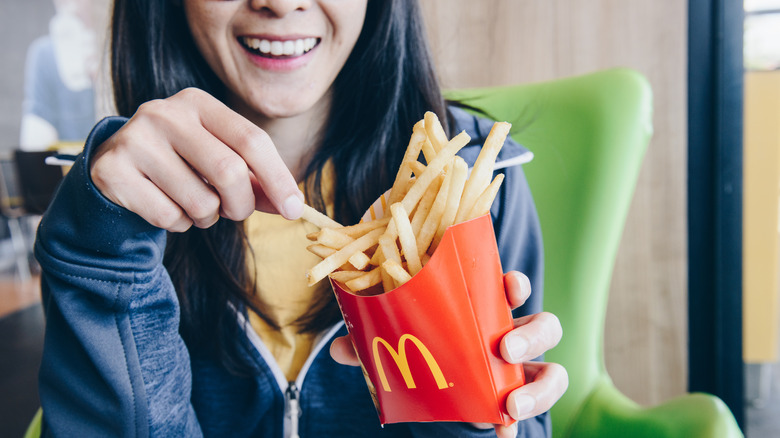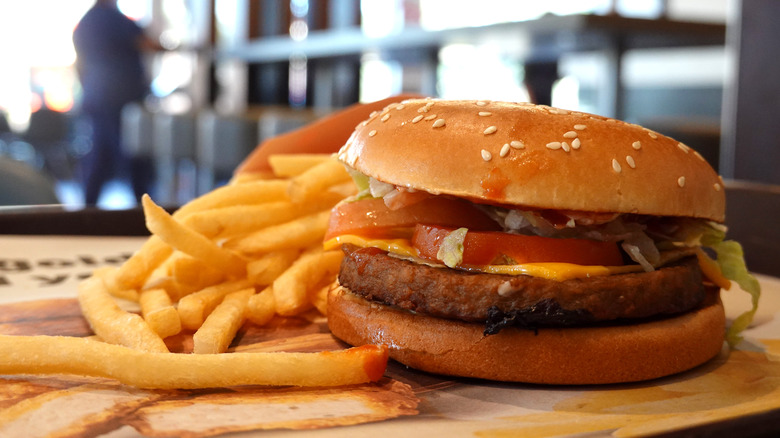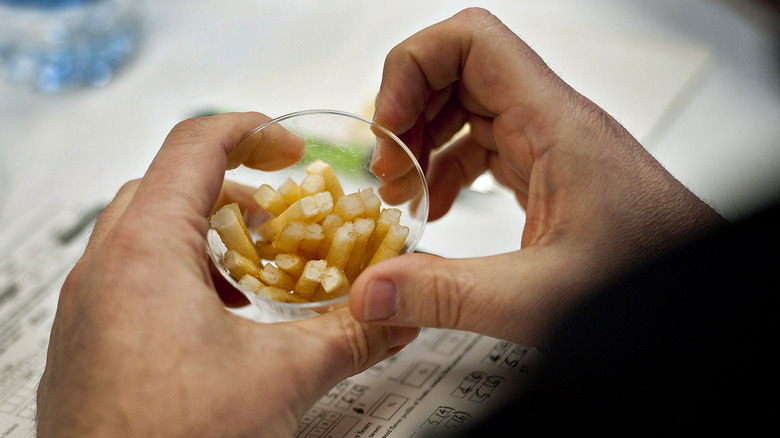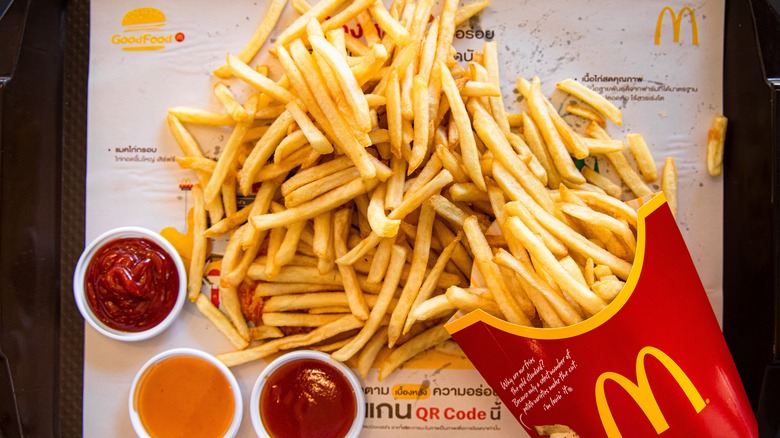Are There Sneaky Ingredients Hidden In McDonald's French Fries?
When you munch on McDonald's french fries, you probably think they're made of potatoes, oil, and some salt. But did you know that there is a lot more that goes into an order of fries?
According to a video McDonald's did with "Mythbusters" host Grant Imahara, there are more than 10 ingredients that go into making a delicious order of fries from the fast-food chain. Some media outlets go to the extent of claiming that this might be the real reason you're craving french fries from this popular American multinational company to begin with. You've got potatoes, canola oil, soybean oil, hydrogenated soybean oil, natural beef flavor, hydrolyzed wheat, hydrolyzed milk, citric acid, dimethylpolysiloxane, dextrose, sodium acid pyrophosphate, salt, canola oil, corn oil, soybean oil, hydrogenated soybean oil, TBHQ (tertiary butylhydroquinone), citric acid, and dimethylpolysiloxane.
If you noticed that some ingredients were listed twice, that's because those are added twice during the manufacturing process: once at the supplier level and again at the restaurant (per HuffPost). A few of these ingredients may sound familiar, while others may seem sneaky. Let's take a look at some of the not-so-clear-cut ones.
Dextrose in McDonald's fries has more to do with color than sweetness
Do you ever wonder how McDonald's manages to produce a characteristic golden hue on all of their fries? They use a form of sugar called dextrose. As explained on their website, this ingredient, derived from maize, also helps the fries cook evenly. The website also claims that this simple sugar isn't used as a sweetener.
Before you start panicking about hidden sugar in your fries, it's important to note that you will find dextrose in other foods too. It's used as a sweetener, as a neutralizer, and also to extend shelf life, according to Medical News Today. While some traces of it in food won't cause harm to your health, simple sugars, in general, are linked with weight gain, cardiovascular issues, diabetes, depression, acne, and fatigue.
If you're wondering just how much sugar is in a McDonald's french fry order, the answer would be 0.3 grams in one large serving (154 grams) of fries, per Nutrition Value.
Beef flavoring doesn't make McDonald's fries vegan-friendly
For vegetarians and vegans out there, the fact that McDonald's uses beef flavoring to produce their fries could be bad news.
According to their website, the flavoring is added to an oil blend that the suppliers use to partially fry the potatoes. "This ensures the great-tasting and recognizable flavor we all love from our World Famous Fries," added the website. As registered dietitian nutritionist Sarah Chatfield told SheFinds, "Vegetarians and anyone with allergies to milk or wheat should avoid McDonald's fries, due to the addition of beef flavoring containing milk and wheat ingredients." Fries are usually the one safe option for vegetarians and vegans who want to grab a quick snack to power through the rest of their day, so this news can be disappointing, to say the least. Perhaps they're better off sampling a McPlant burger, some Veggie Dippers, or a Spicy Veggie wrap instead.
On the other hand, there is also some science to suggest that beef flavoring doesn't contain beef at all. As explained by Gary Reineccius, a food chemist specializing in flavor research (via Eater), "The flavor in beef is created during the cooking process. Food scientists identified the amino acids found in beef, added some very common sugars — starch hydrolysate — put it in a pot, added some citric acid to drop the pH, controlled moisture content, and heated it to the same temperature as meat. Then... *poof* we have meat flavor."
Are trans fats a concern with the fries?
Trans fats are often a concern with fast food. As explained by Chatfield to SheFinds, "Fried fast foods such as French fries are the biggest source of artificial trans fats, since the high frying temperature can increase trans fat content in the cooking oil."
You may already know that trans fats are bad for your health. They increase your risk of heart disease and inflammation, and can also damage the inner lining of your blood vessels, according to Healthline. Also, if you look at what happens to your body when you stop eating fried food, you'll notice that trans fats can be a source of weight gain too.
Unfortunately, the ingredient list for McDonald's French fries contains hydrogenated soybean oil. "For the consumers, they see this long list of more than 10 ingredients and many of them look like big, long, alien chemicals. However to a nutritionist with expertise in biochemistry, the one that makes me not eat McDonald's French fries is hydrogenated oil. Hydrogenated oils are a source of trans fat, which is shown to be negative for human health in many ways," shared registered dietician Georgie Fear (via ABC News).
What about all the other sneaky names in the ingredient list?
If you know anything about the food industry or have simply glanced at labels while at the supermarket, you know that there are a number of items on there that are difficult to pronounce. Most of them might be preservatives, additives, and flavor or color enhancers.
In the case of McDonald's french fries, some of the sneaky names include dimethylpolysiloxane, sodium acid pyrophosphate, and TBHQ. Dimethylpolysiloxane is a foaming agent that's added to oil to prevent excessive foaming or splashing. As explained by Food Additives, the FDA has listed dimethylpolysiloxane as a "secondary direct food additive" that can be safely used in the production of food.
Sodium acid pyrophosphate, or SAPP, is an additive that helps the potatoes retain their appealing hue. "When potatoes are cut and then exposed to air, they turn a green, grayish-brown color which isn't very appealing to the end consumer. This chemical keeps them nice and white-looking. To my knowledge there is no data of any health concerns from sodium acid pyrophosphate," clarified Fear (via ABC News). TBHQ is also FDA-approved, and helps keep the oil from going bad, Fear explained. If you've seen the Instagram video of Paul Saladino claiming the existence of sodium silicoaluminate in the salt provided at McDonald's, he's right. The website confirms this. But, according to Food Additives and Livestrong, silicoaluminate is an anticaking agent used in table salts. It's FDA-approved, as long as it doesn't exceed the prescribed limits.
Are McDonald's french fries good for you?
Asking if starch deep-fried in oil is good for you is like asking if you need added sugar to sustain life. The answer, unsurprisingly, is likely going to be no. French fries are probably not the healthiest food to order at McDonald's.
However, as explained by David Zinczenko, former editor-in-chief of Men's Health, to the Daily Mail, ordering fries every once in a while is not a serious cause for concern; eating them like a food group is. "One out of every six restaurant orders comes with fries, and more than 50% of American potatoes pass through a deep fryer before being sold. When researchers look at the effect of this, it becomes clear that there's a direct connection between French fries and weight gain," he added.
With that said, if you're experiencing some serious potato cravings, home-baked or air-fried potatoes (even better if they were sweet potatoes) might be a healthier alternative.





